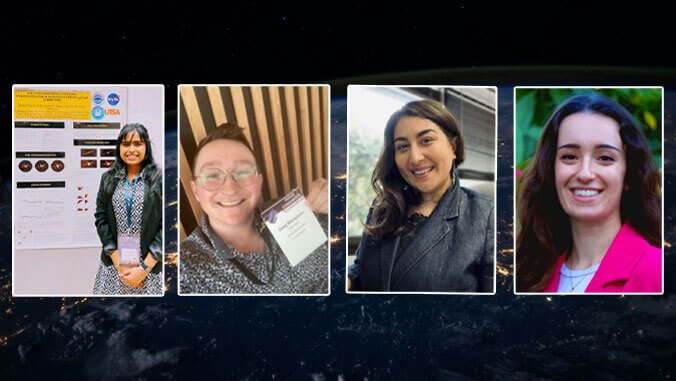
Six graduate students at the University of Hawaiʻi Institute for Astronomy (IfA) have received local and national recognition for their research and mentorship.
Erica Bufanda, a graduate student in the final year of her PhD research project, and Jason Hinkle, a fifth-year student, were awarded Future Investigators in NASA Earth and Space Science and Technology (FINESST) grants for their thesis work. Funded by NASA, these highly-competitive grants are for student-designed research projects that contribute to NASA’s Science Mission Directorate (SMD) science, technology, and exploration goals. It is rare for two graduate students in one department to receive this award, with only 10% of applicants being successful.

Erica Bufanda
Bufanda studies long period comets (LPCs) to address NASA’s SMD goal to understand how our solar system formed. To do this, she leads an observational survey that utilizes three years of coordinated follow-up observations from the Keck, Gemini, and Canada-France-Hawaiʻi Telescope observatories on Maunakea to track and model cometary activity in nearly 100 newly discovered LPCs.
Her ground-based observations and analyses will provide invaluable context for future NASA missions to these types of objects.
Jason Hinkle
Hinkle’s project, “Tidal Disruption Events Under the Multiwavelength Microscope,” studies this long-predicted but only recently observed phenomenon that occurs when a star approaches sufficiently close to a supermassive black hole to be shredded by the black hole’s gravity.
Using data at many wavelengths of light, from X-rays to the radio, he hopes to better understand the details of the material around black holes.

Grey Murphree
Third-year student Grey Murphree received a National Science Foundation Graduate Research Fellowship.
The award provides three full years of funding for graduate school.
Their doctoral dissertation on measuring density fluctuations at high redshift, with IfA Astronomer István Szapudi, will use ground-based data from IfA’s H20 survey and space-based data from the recently-launched Euclid mission, to map the large-scale distribution of matter in the distant Universe.

Maria Vincent
Maria Vincent, a third-year graduate student, was awarded an American Astronomical Society (AAS) International Travel Grant to support travel to the Protostars and Planet VII conference, held in April 2023 in Kyoto, Japan. Vincent presented her work on high-contrast, multi-wavelength imaging of a disk of planet-forming material around a star using the Subaru Coronagraphic Extreme Adaptive Optics suite. Her grant primarily supports early-career scientists, those from smaller institutions or from underserved populations, and whose participation at the meeting is important for U.S. visibility.
“The AAS travel grant is vital in creating an opportunity for early career scientists like me to expand our network and reach in our field of interest. This particular conference was a convention of scientists of all career levels specific to my subfield so I was able to learn a lot, and interact with faculty and students alike from around the world—receiving feedback on my work, meeting potential collaborators, and making some friends along the way,” explained Vincent.
Aldo Sepulveda
Two astronomy graduate students received recognition for their efforts outside of research. Aldo Sepulveda, also a third-year graduate student, received a UH Mānoa Graduate Student Organization Merit Based Award for Mentoring. Given to only two UH graduate students per year across all disciplines, this award recognizes excellence in mentoring. Sepulveda has worked with multiple undergraduate students from under-represented groups to support their STEM careers. Two other students, along with Sepulveda, attended the 241st AAS Meeting in Seattle, Washington, where they presented their research.

Federica Chiti
Third-year student Federica Chiti received the Graduate Student Organization Hannah Liebreich Merit Based Award for Teaching, which recognizes graduate students who use creativity and effort to improve course content/curriculum, and/or go beyond normal teaching responsibilities.
Thanks to this award, she plans to develop an app that uses augmented reality to teach students about the formation and evolution of stars.
Both Sepulveda and Chiti also received Honorable Mentions in the AAS Chambliss Astronomy Achievement Student Awards at the 241st AAS Meeting. These are given to recognize exemplary research by undergraduate and graduate students who present at one of the poster sessions at the AAS annual meetings.
“It is a true pleasure to see our graduate students being recognized for their outstanding efforts in research, mentorship, and teaching,” said IfA astronomer and Graduate Chair Michael Liu. “IfA has a long history of top-notch graduates who go on to become young leaders in their fields, and I look forward to these current award-winners continuing this tradition. But until then, I’m happy they will be with us for a while longer —on top of their academic contributions, they have been lively and engaged members of our community and we are lucky to have them in the IfA ʻohana.”

